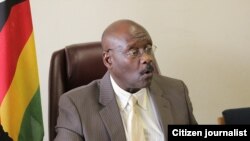Senior doctors in Zimbabwe have joined a strike by junior and middle level doctors plunging the country’s creaking healthcare system into a crisis.
The stoppage is expected to have a further severe impact on public hospitals, already hard-hit by hugely reduced numbers of staff and resources.
The senior doctors announced that they have joined the industrial action alleging that they are struggling to keep operations going as they have been overwhelmed by work following the downing of tools by their juniors.
The country's health sector imploded under the burden of a severe economic crisis.
The economy is saddled with severe socio-economic problems including a fragile treasury, erratic power supplies and lack of clarity over the country’s black empowerment law.
These are big, tectonic issues with no quick fixes for Harare as it has also failed to attract the much-needed foreign direct investment.
Junior doctors downed tools demanding that they wanted an upward review of their salaries and improved working conditions.
HOUSING ALLOWANCE
The junior doctors are bitter that they were forced to take up one-roomed apartments at hospitals after the cash-strapped government scrapped a $300 housing allowance.
The doctors want the government to increase their salaries to about $1,200 from $800 per month.
But the government is struggling to pay civil servants. Finance Minister Patrick Chinamasa in September admitted that Harare’s wage bill is embarrassing and unsustainable, echoing criticism from the International Monetary Fund.
The IMF which signed an extension of a Staff Monitored Program is demanding that Harare reduce its wage bill.
More than three quarters of Zimbabwe’s revenue goes to paying salaries of more than 250,000 civil servants and some alleged ghost workers, leaving little money to whittle down a ballooning debt and to rebuild crumbling public infrastructure such as electricity, roads, schools and hospitals.
"I am embarrassed that our wage bill is some 76% of whatever revenue we receive. It’s not good, it’s not sustainable," Patrick Chinamasa said then.
LOSS OF LIFE
In a statement, the Zimbabwe Hospital Doctors’ Association (ZHDA), which represents the 400 striking doctors, said: “The ZHDA executive committee is compiling a detailed dossier highlighting the challenges, negotiations, written assurances and proposed solutions that shall be submitted to the office of His Excellency, the President of the Republic of Zimbabwe.
“The ZHDA is going to appeal to the president that an urgent solution be found so as to avert the continued suffering and loss of lives.
“The ZHDA notes with great concern and disappointment the casual approach and inappropriately slow response in finding solutions to the crisis.”
Responding, Health Service Board executive director Dr. Lovemore Mbengeranwa told VOA Studio 7 for Zimbabwe that he is hopeful a compromise will be reached though he maintains the doctors engaged in an illegal strike and have been reluctant to engage in meaningful dialogue.
Patients told VOA that they were being turned away from most major government hospitals such as Parirenyatwa Hospital, Harare Central Hospital, Mpilo Hospital and United Bulawayo Hospitals.
Zimbabwe government hospitals suffer perennial staff shortages as well as a lack of equipment and essential drugs. President of the Zimbabwe Hospital Doctors Association Bulawayo Chapter, Emmason Pazara, told VOA that another meeting held Thursday failed to unblock the logjam.
Doctors and nurses have staged a series of strikes in recent years as their salaries have been steadily eroded by the country’s economic crises.
Economic analysts have warned that Zimbabwe is likely to see more strikes in 2014 by dissatisfied workers grappling with an economic recession that is marked by shortages of foreign currency, food and fuel, and rising unemployment.
Thousands of doctors and nurse continue to abandon the country in search of better-paid jobs in Botswana, Namibia, South Africa, Britain and Australia.
Critics have blamed Mr. Robert Mugabe's policies, particularly the seizure of white-owned farms, for damaging the once self-sufficient country.
But Mr. Mugabe, meanwhile, has accused foreign governments of trying to sabotage Zimbabwe's economy and topple him by imposing sanctions on him and his inner circle.





